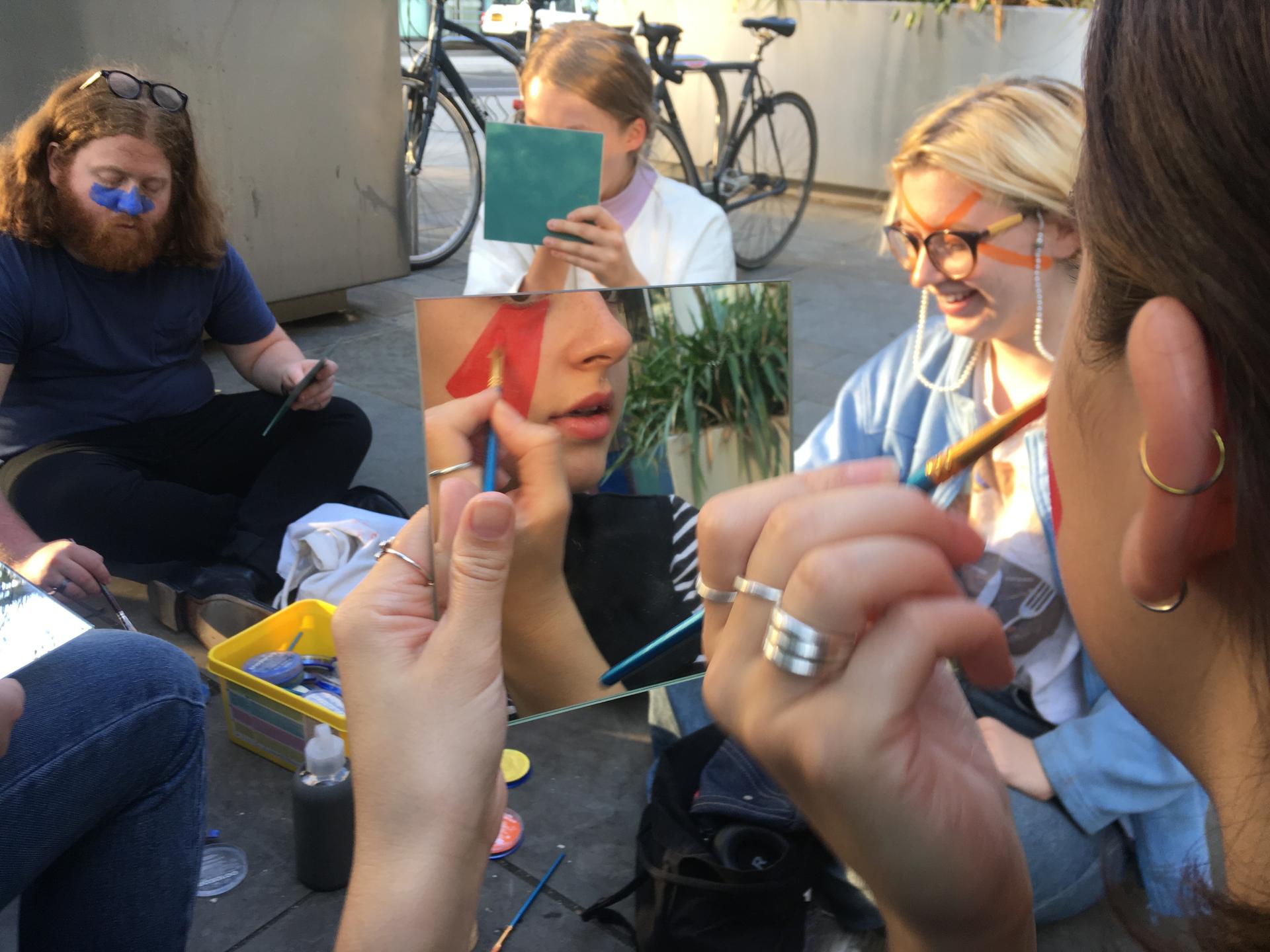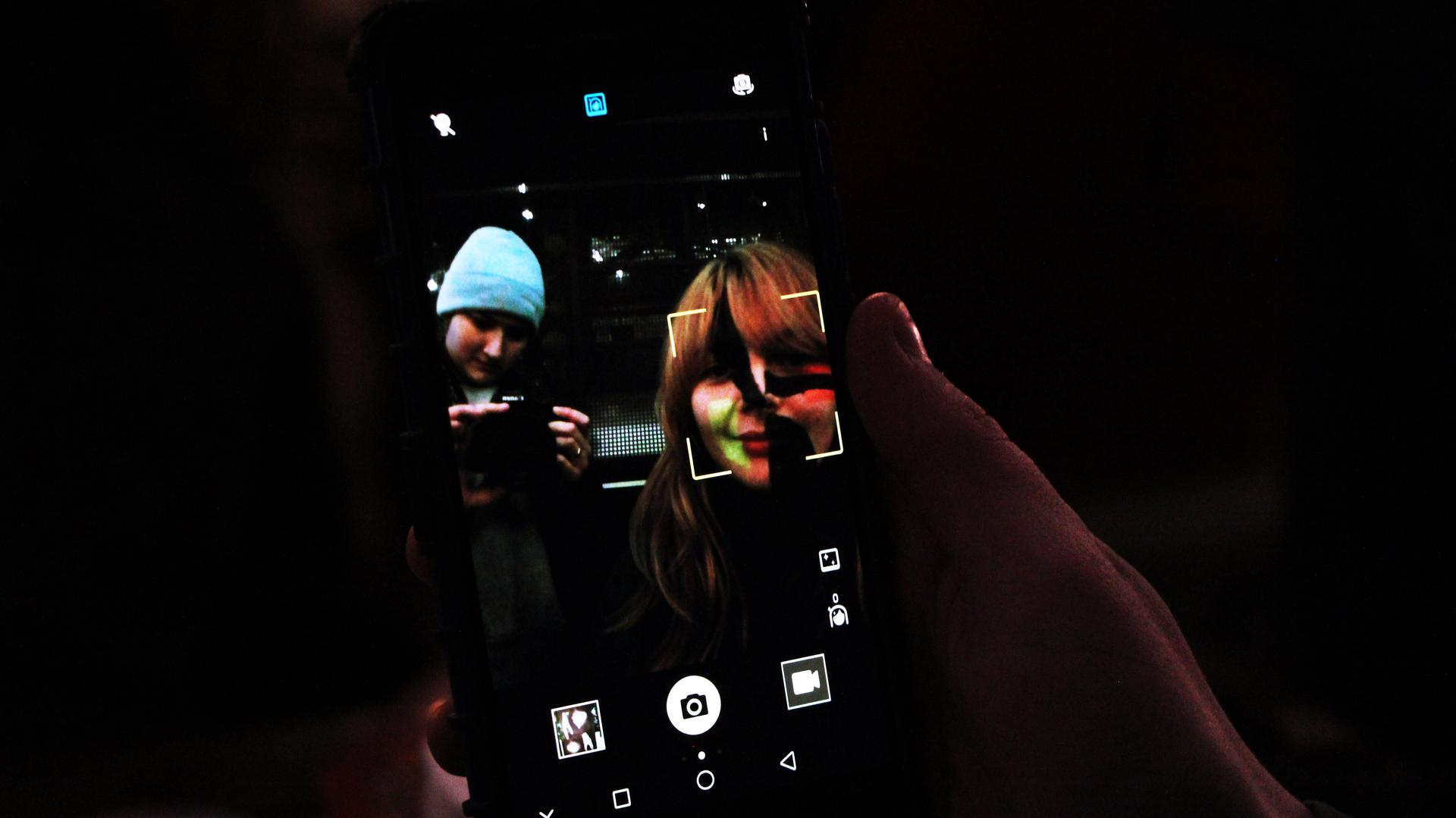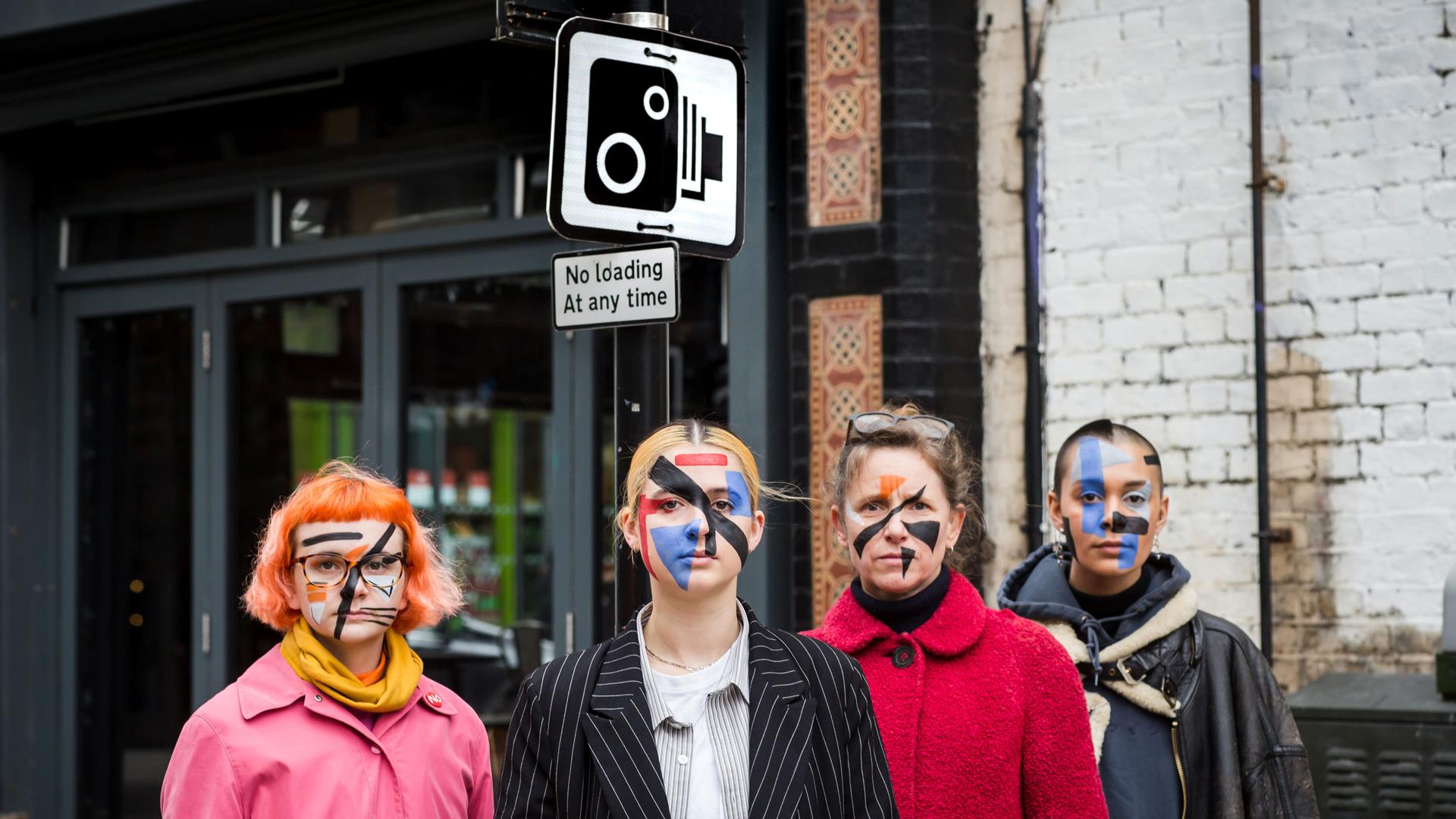London’s Dazzle Club uses makeup to protest police use of facial recognition technology
Members of the Dazzle Club in February 2020.
It’s a rainy evening in East London and a group of people with their faces daubed in bizarre make-up is making their way silently through the neighborhood’s busy streets. Nobody speaks although many commuters and tourists stare. This is The Dazzle Club.
Set up by four artists, the group dons camouflage make-up and leads a silent public walk once a month in protest of live facial recognition police cameras in London. The make-up is called CV Dazzle and, when applied correctly, it tricks the cameras into being unable to detect a face. Artist Evie Price, who leads the walk on a February night, worries about what the police do with the information the cameras observe.
“What are they doing with the data that they’re collecting?” said Price. “They say it’s for safety purposes and preventative policing, but we have no evidence that what they’re actually using it for is working.”
London is already one of the most surveilled cities in the world with around 420,000 CCTV cameras in operation. Washington, D.C., has around 30,000 in comparison. Yet London police are pushing ahead with plans to implement the facial recognition technology across the city.
Price and The Dazzle Club aren’t the only ones troubled by the increased surveillance. Civil liberties campaign group Big Brother Watch believes the technology could alter how the police view members of the public. Director Silkie Carlo compares the cameras to a police line-up.
“It actually starts to reverse the presumption of innocence. It means that members of the public in our everyday lives are effectively being subjected to a constant police lineup, constantly having our identities checked to make sure that we’re not criminals,” Carlo said.

The cameras currently do not operate 24-7 but are implemented on a staggered basis in parts of London. They work by scanning people’s faces and then comparing those images to a list of suspects police have already inputted into the system. London’s assistant police commissioner, Nick Ephgrave, said the technology does not store images of people’s faces, unless they are on the list.
“Every image that is looked at by the technology, if there is no match, it’s instantaneously deleted. The only images that are retained are those where there has been an alert. And they are retained for a maximum of 31 days,” Ephgrave said.
London police claim the cameras are 70% accurate, but that does not concur with the findings of an independent study into the technology. Professor Pete Fussey, an expert in surveillance with Essex University was commissioned by the police to review the effectiveness of the system. His results differed greatly from those of the police.
“On the six trials that I observed, there were 42 times in which the facial recognition system alerted operators that someone passed the cameras, who matched the database. In only eight of those cases, was it verifiably correct that the person was without any doubt the person that had been matched,” Fussey said.
That’s an accuracy rate of 19%.
But despite the independent report, London police are not the only ones pushing for the technology to be expanded. Retailers across Britain have also started to use live facial recognition cameras in their stores. Facewatch, one company that provides facial recognition technology, says the failure of police to tackle low-level crimes, like shop-lifting, is driving more shop-owners to use the cameras. Facewatch CEO Nick Fisher says they’re proving very effective.
“Everywhere we’ve deployed Facewatch today, within 90 days of deployment, all our businesses have reported a greater than 25% reduction in store theft. And without question, the employees in the store, they’re reporting that they feel a lot safer,” Fisher said.
Workers may feel safer but there is concern about how the system operates. It is up to the shop-owners themselves to input details of a possible thief into the shared database. Fisher says there are safeguards in place to prevent against an innocent person being logged into the database, but groups like Big Brother Watch worry that this leaves the law in the hands of shop owners and security guards.

The live facial recognition technology used by police is also legally a grey area. The European Commission, for example, is considering a ban on the technology in public places for three to five years while regulations are put in place. And there’s a legal challenge making its way through the UK’s court system.
But London police seem determined to press on. Metropolitan Police Commissioner Cressida Dick recently dismissed campaigners’ worries saying concerns about privacy feel “much, much smaller” than worrying about “a knife through the chest.”
Artist Anna Hart, one of the founders of The Dazzle Club disagrees. A 15-year-old teenager was stabbed across the street from her home a few days ago.
“But this stuff didn’t keep him safe,” she said.
The Dazzle Club doesn’t yet know if the camouflage makeup will truly fool police cameras. Artist Georgina Rowlands, a fellow Club founder says they haven’t been able to access the software the London police use.
“So we haven’t been able to test it just yet. But we would love to see if it works,” Rowlands said.
After an hour, the silent walk comes to an end and the group all head to a local pub to have a beer and chat. Claudia and James, who didn’t share their full identities, joined the walk that night for the first time. Claudia says she found the experience uplifting.
“I found it quite enlightening actually, I don’t often walk through London in silence, let alone with my face painted. I thought I was going to get stared at and heckled at. And actually weirdly, people ignored us.”
James said he was worried about the extent to which the cameras are already being used around the world.
“Facial recognition is a huge thing already and especially when you look at what’s happening in China. [The walk] just seemed a really nice way of, you know, pushing back against that.”
The Dazzle Club is planning another protest walk later this month but the police do not seem too deterred. The conservative government recently promised to “empower police with new technologies,” and it might take more than camouflage make-up to prevent live facial recognition cameras from becoming part of the new normal in London.
We want to hear your feedback so we can keep improving our website, theworld.org. Please fill out this quick survey and let us know your thoughts (your answers will be anonymous). Thanks for your time!
